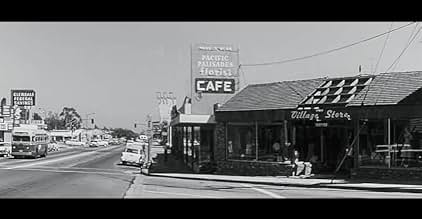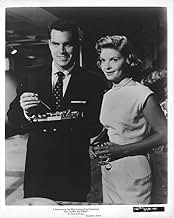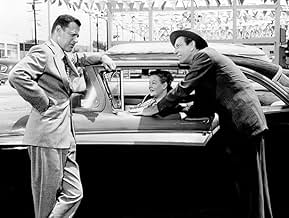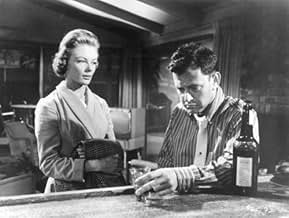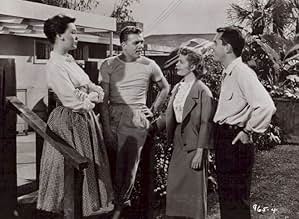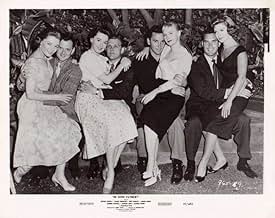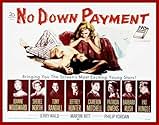NOTE IMDb
7,1/10
1,4 k
MA NOTE
Ajouter une intrigue dans votre langueIn California, four couples who have bought houses near one another face problems, alcoholism, racism, promiscuity, and discrimination against lack of education, until a tragic event forces ... Tout lireIn California, four couples who have bought houses near one another face problems, alcoholism, racism, promiscuity, and discrimination against lack of education, until a tragic event forces them to reassess their lives.In California, four couples who have bought houses near one another face problems, alcoholism, racism, promiscuity, and discrimination against lack of education, until a tragic event forces them to reassess their lives.
- Réalisation
- Scénario
- Casting principal
- Nomination aux 2 BAFTA Awards
- 1 victoire et 2 nominations au total
Robert H. Harris
- Markham
- (as Robert Harris)
Robert Burton
- Mr. Cagle
- (non crédité)
Mary Carroll
- Mrs. Burnett
- (non crédité)
George Chester
- Car Attendant
- (non crédité)
Heinie Conklin
- Church Member
- (non crédité)
Frank Gerstle
- Verdun
- (non crédité)
Mimi Gibson
- Sandra Kreitzer
- (non crédité)
Charles Herbert
- Michael Flagg
- (non crédité)
Avis à la une
It may not be Peyton Place but this tight-knit Californian community is still plagued by maritial infidelity, heavy drinking, domestic abuse, rape and, of course, racial prejudice. Martin Ritt's "No Down Payment" benefits from being well-written, (Philip Yordan), nicely photographed in black-and-white Cinemascope, (Joseph LaShelle), and it features a good cast of up-and-coming Fox stars headed by Joanne Woodward, (very good), though it's Tony Randall and Pat Hingle who walk off with the picture. Considered very daring and adult in its day, it now seems pretty tame but it did pave the way for a number of 'grown-up' American movies in the late fifties and early sixties and is actually a very good example of its kind. Worth rediscovering.
The performances of Pat Hingle and Barbara Rush seem very modern to me. When he washes the car while the rest of the community goes to church, she gently admonishes him for not going to church, but conveys to the audience that this has long been a point of contention between them, and that she understands his reasons - just as he understands her desire to have him attend church. However, like any intelligent wife, she doesn't go over old ground; she simply suggests a compromise. She negotiates with him quickly and easily by suggesting that he wash the car after church from now on. He easily agrees, and the matter is settled. In at least three other scenes,they're shown disagreeing about various issues - however, they do it calmly and maturely, and with a healthy dose of humor.
One scene explains, with charm, that they are simpatico in the bedroom, too. She doesn't make him bust his chops wooing her, and she doesn't pretend that she isn't interested, like good little 1950's girls were supposed to do,
Most moving is a scene in which they have their worst disagreement, and both actors effectively evoke their unhappiness about not being on the same page. One senses that this couple is very close, and that they derive strength from their partnership. After this worst disagreement, they attend a party at which Pat Hingle approaches his wife in a tender way, and asks her to dance. She agrees immediately, and in the following scenes, we see them dancing happily, and exchanging reassuring looks.
I think this couple's marriage depicts a healthy relationship. They're always ready to calmly discuss things, to hear each other out, and be fair. Their goal in any discussion seems to be reaching a fair agreement, and getting back to being good friends, as well as lovers.
In my opinion, Pat Hingle helms this movie. The other characters seem dated. For example, Hingle is the only one who jumps up to call the police after a crime has been committed; Hingle is the only one who is sensibly, not insanely, ambitious; Hingle is the only one who doesn't seem interested in other women; Hingle is the only one who considers his wife a partner, and values her opinion; Hingle is the one who is physically affectionate with his children; and most importantly, Hingle is the one who raises questions about racism and intellectual bigotry. And thanks to the script, he isn't a crusader. He is a man who is open-minded enough to contemplate these issues as they are presented to him, and to question the passive bigotry that he comes to realize has been ingrained in him by his family and country.
Hingle and Rush's characters ring true, and are beautifully portrayed by the actors. The other characters are broadly-drawn, one dimensional, and have not aged well.
One scene explains, with charm, that they are simpatico in the bedroom, too. She doesn't make him bust his chops wooing her, and she doesn't pretend that she isn't interested, like good little 1950's girls were supposed to do,
Most moving is a scene in which they have their worst disagreement, and both actors effectively evoke their unhappiness about not being on the same page. One senses that this couple is very close, and that they derive strength from their partnership. After this worst disagreement, they attend a party at which Pat Hingle approaches his wife in a tender way, and asks her to dance. She agrees immediately, and in the following scenes, we see them dancing happily, and exchanging reassuring looks.
I think this couple's marriage depicts a healthy relationship. They're always ready to calmly discuss things, to hear each other out, and be fair. Their goal in any discussion seems to be reaching a fair agreement, and getting back to being good friends, as well as lovers.
In my opinion, Pat Hingle helms this movie. The other characters seem dated. For example, Hingle is the only one who jumps up to call the police after a crime has been committed; Hingle is the only one who is sensibly, not insanely, ambitious; Hingle is the only one who doesn't seem interested in other women; Hingle is the only one who considers his wife a partner, and values her opinion; Hingle is the one who is physically affectionate with his children; and most importantly, Hingle is the one who raises questions about racism and intellectual bigotry. And thanks to the script, he isn't a crusader. He is a man who is open-minded enough to contemplate these issues as they are presented to him, and to question the passive bigotry that he comes to realize has been ingrained in him by his family and country.
Hingle and Rush's characters ring true, and are beautifully portrayed by the actors. The other characters are broadly-drawn, one dimensional, and have not aged well.
"No Down Payment" is truly one of the great lost Fifties movies. Released in 1957, the year that the forced integration of Little Rock and the Soviet's launching of Sputnik forced America out of it's smug complacency, this movie truly shows us another side of suburban utopia. This flick was filmed when suburban California seemed to be everyone's ideal of the good life which, from the start, this movie portrays quite well. Barbecues with the neighbors, kids playing in the yard, trimmed lawns and freshly painted houses, this neighborhood has it all. What could go wrong?
The fact that Jeffrey Hunter and Patricia Owens were, frankly, not as good in their vocation as their fellow actors, somehow works very well here. They play the new couple in the neighborhood. They're naive, filled with expectations and enthusiastic to make a home in this cozy corner of the suburbs and they manage to give the viewer a similar feeling. We want what they want - the perfect neighbors - supportive friends and caring advisers who still allow us our privacy and our boundaries. That's what this great cast has to offer...they're perfect.
But are they? Skillfully, we begin to catch on to these neighbor's individual character defects. Joanne Woodward, fresh off "Three Faces of Eve", plays her character with her usual complex aplomb. Sheree North and Barbara Rush, two Fifties beauties, are comfortable here with their good looks and their knack for understanding men..or perhaps it's manipulating men? As always, Cameron Mitchell takes his man's man character in an unexpected direction. And Pat Hingle, often the embodiment of stability in his roles, takes it all in stride or does he? Then there's Tony Randall, sidekick of Rock Hudson in all those great light Doris Day comedies. Tony Randall gives us a character we'll never forget...this performance proves Randall was and is a great, great actor.
Four husbands, four wives, eight stunning acting performances. Was the dream offered to us by "Father Knows Best" and Ozzie's family really too good to be true? Maybe not - suburban California is a far cry from the inner city tenements so many of our ancestors dwelt in...Except, this is 1957. The turbulent Sixties are just around the bend. California is about to explode into riots, war protests and hippies searching for the bum trip tent. Besides, you know what they say about something being too good to be true..........
The fact that Jeffrey Hunter and Patricia Owens were, frankly, not as good in their vocation as their fellow actors, somehow works very well here. They play the new couple in the neighborhood. They're naive, filled with expectations and enthusiastic to make a home in this cozy corner of the suburbs and they manage to give the viewer a similar feeling. We want what they want - the perfect neighbors - supportive friends and caring advisers who still allow us our privacy and our boundaries. That's what this great cast has to offer...they're perfect.
But are they? Skillfully, we begin to catch on to these neighbor's individual character defects. Joanne Woodward, fresh off "Three Faces of Eve", plays her character with her usual complex aplomb. Sheree North and Barbara Rush, two Fifties beauties, are comfortable here with their good looks and their knack for understanding men..or perhaps it's manipulating men? As always, Cameron Mitchell takes his man's man character in an unexpected direction. And Pat Hingle, often the embodiment of stability in his roles, takes it all in stride or does he? Then there's Tony Randall, sidekick of Rock Hudson in all those great light Doris Day comedies. Tony Randall gives us a character we'll never forget...this performance proves Randall was and is a great, great actor.
Four husbands, four wives, eight stunning acting performances. Was the dream offered to us by "Father Knows Best" and Ozzie's family really too good to be true? Maybe not - suburban California is a far cry from the inner city tenements so many of our ancestors dwelt in...Except, this is 1957. The turbulent Sixties are just around the bend. California is about to explode into riots, war protests and hippies searching for the bum trip tent. Besides, you know what they say about something being too good to be true..........
Call it a soap opera if you like, but "No Down Payment" is a riveting slice of late 1950s life from Surburbia, USA. This movie follows the intertwining lives of several suburban families in a generic U.S. city, and is fascinating to watch.
We've all seen the characters in our own lives: the bookish engineer (Hunter), the quietly desperate alcoholic car salesman (Randall), the town official with nothing but excuses (Hingle), the violent type that settles everything with his fists (Mitchell), and so on. Great acting by all concerned, along with Ritt's sure direction, make this a winner.
My only complaint is the women's roles. Joanne Woodward produces a great performance, but all the other women's roles are somewhat one-dimensional, and involve spending all day keeping house or setting the dinner table. I guess it's a reflection of the 1950s, but it's still disappointing.
Fine performances, particularly from Woodward, Hunter, and Randall, produce a grade-A effort. Watch it with the 1950s in mind.
We've all seen the characters in our own lives: the bookish engineer (Hunter), the quietly desperate alcoholic car salesman (Randall), the town official with nothing but excuses (Hingle), the violent type that settles everything with his fists (Mitchell), and so on. Great acting by all concerned, along with Ritt's sure direction, make this a winner.
My only complaint is the women's roles. Joanne Woodward produces a great performance, but all the other women's roles are somewhat one-dimensional, and involve spending all day keeping house or setting the dinner table. I guess it's a reflection of the 1950s, but it's still disappointing.
Fine performances, particularly from Woodward, Hunter, and Randall, produce a grade-A effort. Watch it with the 1950s in mind.
This 20th Century Fox expose of "the good life" in the suburbs wasn't seen by anybody much in 1957, and it's easy to see why: It probes convincingly deep into the less pleasant aspects of this clean, all-white subculture, and suburban moviegoers probably didn't want to see their worst aspects on screen, and urban audiences didn't care. Early Martin Ritt, and typically thorough of him, it explores prejudice, sexism, alcoholism, war veterans with what would now be diagnosed as PTSD, and capitalism's way of trapping young families in debt. The wide-screen black-and-white cinematography is clean and alluring, and all eight principals do well--Sheree North, groomed by 20th to be a threat to Monroe, proves once again that they didn't really give her enough chances to show what she could do. The shiny surfaces and flattering clothes and powerful cars all illustrate that "good life," and show what's wrong with it. And in comprehensively exploring the roots and hypocrisies and effects of racism at the time, it's a good deal braver than many contemporary films.
Le saviez-vous
- AnecdotesOf Joanne Woodward's films, this is her personal favorite.
- Citations
Jerry Flagg: I couldn't come home. I was feeling so punk.
- ConnexionsFeatured in Sex at 24 Frames Per Second (2003)
- Bandes originalesThe Drive-In Rock
(uncredited)
Music by Lionel Newman
Lyrics by Carroll Coates
[The song first played and danced to at the Flaggs' dinner party, then played later when Troy rushes home after finding out about the Police Chief job]
Meilleurs choix
Connectez-vous pour évaluer et suivre la liste de favoris afin de recevoir des recommandations personnalisées
- How long is No Down Payment?Alimenté par Alexa
Détails
- Date de sortie
- Pays d’origine
- Langue
- Aussi connu sous le nom de
- No Down Payment
- Lieux de tournage
- 15281 W. Sunset Blvd., Pacific Palisades, Los Angeles, Californie, États-Unis(Troy Boone's Mobil gas station)
- Sociétés de production
- Voir plus de crédits d'entreprise sur IMDbPro
Box-office
- Budget
- 995 000 $US (estimé)
- Durée
- 1h 45min(105 min)
- Couleur
- Rapport de forme
- 2.35 : 1
Contribuer à cette page
Suggérer une modification ou ajouter du contenu manquant

